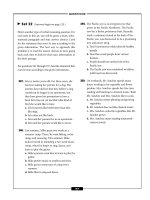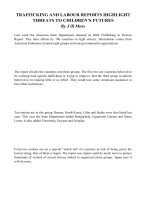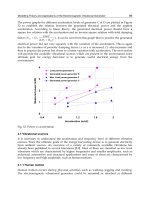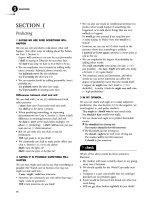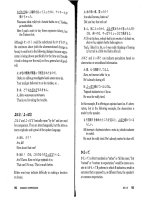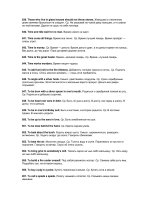Past exams and examination reports 6
Bạn đang xem bản rút gọn của tài liệu. Xem và tải ngay bản đầy đủ của tài liệu tại đây (142.1 KB, 14 trang )
Victorian Certificate of Education
2012
ENGLISH
Written examination
Thursday 1 November 2012
Reading time: 9.00 am to 9.15 am (15 minutes)
Writing time: 9.15 am to 12.15 pm (3 hours)
TASK BOOK
Section
A – Text response
B – Writing in Context
C – Analysis of language use
Number of
questions
Number of questions
to be answered
20
4
1
1
1
1
Marks
20
20
20
Total 60
• Students are to write in blue or black pen.
• Students are permitted to bring into the examination room: pens, pencils, highlighters, erasers, rulers
and an English and/or bilingual printed dictionary.
• Students are NOT permitted to bring into the examination room: blank sheets of paper and/or white
out liquid/tape.
• No calculator is allowed in this examination.
Materials supplied
• Task book of 14 pages, including Examination assessment criteria on page 14.
• One answer book.
Instructions
• Write your student number and name on the front cover of the answer book.
• Complete each of the following in the answer book.
– Section A: Text response
– Section B: Writing in Context
– Section C: Analysis of language use
• Each section should be completed in the correct part of the answer book.
• All written responses must be in English.
• If you write on a film text in Section A, you must not write on a film text in Section B.
• You may ask the supervisor for extra answer books.
At the end of the task
• Enclose any extra answer books inside the front cover of the first answer book.
• You may keep this task book.
Students are NOT permitted to bring mobile phones and/or any other unauthorised electronic
devices into the examination room.
© VICTORIAN CURRICULUM AND ASSESSMENT AUTHORITY 2012
2012 ENGL EXAM
2
SECTION A – Text response
Instructions for Section A
Section A requires students to complete one analytical/expository piece of writing in response to one
topic (either i. or ii.) on one selected text.
Indicate the text selected and whether you are answering i. or ii.
In your response you must develop a sustained discussion of one selected text from the Text list below.
Your response must be supported by close reference to and analysis of the selected text.
For collections of poetry or short stories, you may choose to write on several poems or short stories, or
on one or two in very close detail, depending on what you think is appropriate.
Your response will be assessed according to the criteria set out on page 14 of this book.
Section A is worth one-third of the total assessment for the examination.
If you write on a film text in Section A, you must not write on a film text in Section B.
Text list
1.
A Christmas Carol ............................................................................................................. Charles Dickens
2.
A Farewell to Arms ....................................................................................................... Ernest Hemingway
3.
A Human Pattern: Selected Poems ........................................................................................ Judith Wright
4.
Bypass: The Story of a Road.............................................................................................. Michael McGirr
5.
Cat’s Eye .......................................................................................................................... Margaret Atwood
6.
Così ......................................................................................................................................... Louis Nowra
7.
Dear America – Letters Home from Vietnam .................................................. Edited by Bernard Edelman
8.
Dreams from My Father ...................................................................................................... Barack Obama
9.
Henry IV, Part I...........................................................................................................William Shakespeare
10. Interpreter of Maladies ......................................................................................................... Jhumpa Lahiri
11. Life of Pi ...................................................................................................................................Yann Martel
12. On the Waterfront ................................................................................................... Directed by Elia Kazan
13. Ransom .................................................................................................................................. David Malouf
14. The Old Man Who Read Love Stories.................................................................. Directed by Rolf de Heer
15. The Reluctant Fundamentalist ............................................................................................. Mohsin Hamid
16. The War Poems ......................................................................................................................Wilfred Owen
17. Things We Didn’t See Coming ....................................................................................... Steven Amsterdam
18. Twelve Angry Men ................................................................................................................ Reginald Rose
19. Will You Please Be Quiet, Please?.................................................................................... Raymond Carver
20. Year of Wonders ............................................................................................................... Geraldine Brooks
SECTION A – continued
3
1.
2012 ENGL EXAM
A Christmas Carol by Charles Dickens
i. ‘Despite his mean and miserable ways, we never completely dislike Scrooge.’
Discuss.
OR
ii.
2.
‘Generosity is not just about the giving of money.’
How is this idea explored in A Christmas Carol?
A Farewell to Arms by Ernest Hemingway
i. To what extent is Frederic changed by his relationships in A Farewell to Arms?
OR
ii.
3.
‘In Hemingway’s novel, there is no farewell to arms.’
Do you agree?
A Human Pattern: Selected Poems by Judith Wright
i. How does the poetry in this selection reflect what Wright refers to as her “search for wholeness”?
OR
ii.
4.
‘It is Wright’s imagery that makes her poetry so engaging.’
Discuss.
Bypass: The Story of a Road by Michael McGirr
i. ‘Roads aren’t meant to be travelled alone.’
How important are other people in McGirr’s journey along the Hume Highway?
OR
ii.
5.
“A bicycle is the perfect vehicle for exploration.”
To what extent is McGirr an explorer?
Cat’s Eye by Margaret Atwood
i. ‘Elaine’s painting is both a form of therapy and a means of revenge.’
Discuss.
OR
ii.
6.
To what extent have cruelty and kindness shaped the relationships in Cat’s Eye?
Così by Louis Nowra
i. ‘In Così, the quality of the final production is not as important as what happens during rehearsals.’
Do you agree?
OR
ii.
Is Così more about love than madness?
SECTION A – continued
TURN OVER
2012 ENGL EXAM
7.
4
Dear America – Letters Home from Vietnam edited by Bernard Edelman
i. ‘Along with confusion, pain and despair, there is a strong message of hope in these letters.’
Do you agree?
OR
ii.
8.
‘The reader cannot help feeling that the soldiers are victims of war.’
Discuss.
Dreams from My Father by Barack Obama
i. Obama’s Kenyan grandmother says to him, “. . . a man can never be too busy to know his own
people”.
Why was it important to Obama to know his own people?
OR
ii.
9.
‘Barack Obama learns that collision between cultures is as much a feature of life in Africa as it is
in America.’
Discuss.
Henry IV, Part I by William Shakespeare
i. “Thou art not what thou seemest.”
‘Playing a part is the only way to gain power in Henry IV, Part I.’
Discuss.
OR
ii.
‘Shakespeare’s Henry IV, Part I explores what it means to be an honest and honourable man.’
Discuss.
10. Interpreter of Maladies by Jhumpa Lahiri
i. ‘Poor communication and unexpressed feelings cause distress for characters in these stories.’
Discuss.
OR
ii.
‘Lahiri’s stories suggest that it is difficult to maintain happiness in close relationships.’
Discuss.
11. Life of Pi by Yann Martel
i. ‘The reader prefers to believe Pi’s original version of events rather than the later version.’
Do you agree?
OR
ii.
‘Life of Pi suggests that life demands a choice between resistance and surrender.’
Discuss.
SECTION A – continued
5
2012 ENGL EXAM
12. On the Waterfront directed by Elia Kazan
i. How does Kazan create tension and suspense in On the Waterfront?
OR
ii.
‘It is not only through physical violence that the mob maintains its power.’
Do you agree?
13. Ransom by David Malouf
i. ‘Ransom demonstrates that it is a man’s actions that define him.’
Discuss.
OR
ii.
‘Despite the violence in Ransom, the reader is left with a sense of optimism.’
Discuss.
14. The Old Man Who Read Love Stories directed by Rolf de Heer
i. ‘Antonio is an exile from both of the worlds depicted in The Old Man Who Read Love Stories.’
Discuss.
OR
ii.
How does de Heer use Antonio’s memories in The Old Man Who Read Love Stories?
15. The Reluctant Fundamentalist by Mohsin Hamid
i. ‘Changez is gradually revealed as an unreliable narrator.’
Discuss.
OR
ii.
Why does Changez feel out of place in both America and Pakistan?
16. The War Poems by Wilfred Owen
i. ‘Owen’s poems reveal tenderness and compassion towards those whose lives have been destroyed
by the war.’
Discuss.
OR
ii.
‘The poems condemn those who encourage young men to go to war.’
Discuss.
17. Things We Didn’t See Coming by Steven Amsterdam
i. ‘To survive in the situations depicted in Things We Didn’t See Coming, people need to be
adaptable.’
Discuss.
OR
ii.
‘Amsterdam’s characters are motivated by self-interest.’
Discuss.
SECTION A – continued
TURN OVER
2012 ENGL EXAM
6
18. Twelve Angry Men by Reginald Rose
i. ‘Twelve Angry Men highlights the importance of seeing things from more than one perspective.’
Discuss.
OR
ii.
‘Twelve Angry Men is a play about how power can be misused.’
Discuss.
19. Will You Please Be Quiet, Please? by Raymond Carver
i. ‘In these stories, Carver shows more sympathy for men than for women.’
Discuss.
OR
ii.
‘In Will You Please Be Quiet, Please?, Carver presents lives that seem hopeless.’
Discuss.
20. Year of Wonders by Geraldine Brooks
i. ‘In the face of the plague, the characters’ beliefs disintegrate.’
Discuss.
OR
ii.
‘The ignorance of the villagers is more powerful than Anna’s growing knowledge.’
Discuss.
END OF SECTION A
7
2012 ENGL EXAM
SECTION B – Writing in Context
Instructions for Section B
Section B requires students to complete an extended written response.
Indicate the Context and the main text drawn upon in the answer book.
In your writing, you must draw on ideas suggested by one of the four Contexts.
Your writing must draw directly from at least one selected text that you have studied for this Context
and be based on the ideas in the prompt.
Your response may be an expository, persuasive or imaginative piece of writing.
If you write on a selected film text in Section A, you must not write on a selected film text in
Section B.
Section B is worth one-third of the total assessment for the examination.
Your response will be assessed according to the criteria set out on page 14 of this book.
SECTION B – continued
TURN OVER
2012 ENGL EXAM
8
Context 1 – The imaginative landscape
Island................................................................................................................................. Alistair MacLeod
One Night the Moon .......................................................................................... Directed by Rachel Perkins
Peripheral Light – Selected and New Poems.......................................................................... John Kinsella
Tirra Lirra by the River...................................................................................................... Jessica Anderson
Prompt
‘The ways in which we understand a landscape and respond to it can
change over time.’
Task
Complete an extended written response in expository, persuasive or imaginative style. Your writing must
draw from at least one selected text for this Context and explore the idea that ‘the ways in which we
understand a landscape and respond to it can change over time’.
OR
Context 2 – Whose reality?
A Streetcar Named Desire ............................................................................................. Tennessee Williams
Spies ....................................................................................................................................... Michael Frayn
The Lot: In Words................................................................................................................. Michael Leunig
The Player .......................................................................................................... Directed by Robert Altman
Prompt
‘Our fantasies can be more powerful than our reality.’
Task
Complete an extended written response in expository, persuasive or imaginative style. Your writing must
draw from at least one selected text for this Context and explore the idea that ‘our fantasies can be
more powerful than our reality’.
OR
SECTION B – continued
9
2012 ENGL EXAM
Context 3 – Encountering conflict
Paradise Road................................................................................................. Directed by Bruce Beresford
The Crucible............................................................................................................................. Arthur Miller
The Quiet American ............................................................................................................. Graham Greene
The Rugmaker of Mazar-e-Sharif ........................................................... Najaf Mazari and Robert Hillman
Prompt
‘The experience of conflict changes people’s priorities.’
Task
Complete an extended written response in expository, persuasive or imaginative style. Your writing must
draw from at least one selected text for this Context and explore the idea that ‘the experience of conflict
changes people’s priorities’.
OR
Context 4 – Exploring issues of identity and belonging
Growing up Asian in Australia ................................................................................... Edited by Alice Pung
Skin................................................................................................................... Directed by Anthony Fabian
Sometimes Gladness.................................................................................................................. Bruce Dawe
The Member of the Wedding ............................................................................................ Carson McCullers
Prompt
‘Each person has different identities for different relationships and
situations.’
Task
Complete an extended written response in expository, persuasive or imaginative style. Your writing
must draw from at least one selected text for this Context and explore the idea that ‘each person has
different identities for different relationships and situations’.
END OF SECTION B
TURN OVER
2012 ENGL EXAM
10
This page is blank
11
2012 ENGL EXAM
SECTION C – Analysis of language use
Instructions for Section C
Section C requires students to analyse the ways in which language and visual features are used to
present a point of view.
Section C is worth one-third of the total assessment for the examination.
Read the material on pages 12 and 13 and then complete the task below.
Write your analysis as a coherently structured piece of prose.
Your response will be assessed according to the criteria set out on page 14 of this book.
TASK
How is written and visual language used to attempt to persuade the audience to share the point of view of
the speaker?
Background information
• Pages 12 and 13 contain the transcript of a speech by Mrs Elliot, a retired
teacher-librarian, at the opening of ‘Reading: the future’, a forum on reading
and literacy-related activities.
• Two slides used by the speaker during her presentation are also shown.
• The audience included teachers, librarians and senior school students from local
schools.
SECTION C – continued
TURN OVER
2012 ENGL EXAM
12
Good morning fellow book-lovers.
I have always been what’s known as an ‘early adopter’, someone who is enthusiastic about new
technology.
As a teenager I was excited to learn about the massive change that hit the world when Gutenberg
invented the first printing press in the 15th century. Until then, books were extremely precious and rare
objects made by hand and owned only by the rich, but with this new machine they could be produced
again and again. The number of books in the world exploded.
I like change. So when electronic books arrived, I rushed out to buy an e-reading device. I thought
making books easier to get, cheaper to own and more convenient to carry had to be a good thing. I
wanted to be free of the expense that goes with a lifetime of book-buying, and I wanted effortless
library borrowing and effortless return of books. I imagined children setting off to school without the
terrible burden of their great big textbooks.
A slide from the presentation
Due to copyright restriction,
this material is not supplied.
Source: photo.ua/shutterstock.com
Like many of you I’m an enthusiastic reader and I see books as a doorway to other worlds – worlds
that we actively create in our imaginations, using someone else’s words.
My enthusiasm extends to e-books. Some things about them are great. I love being able to change the
brightness settings and the font size; it’s fun to look up a dictionary or Wikipedia just by selecting a
word. And it’s exciting to know that e-books can break through the limitations of the printing press.
So what’s to worry about?
Well, I do wonder about the video and animated images that some e-books will contain. They might
become a kind of substitute for genuine reading. Recently I saw a TV ad showing a child, all alone,
looking at a tablet device. At first I thought he was reading, but he wasn’t. He was viewing – some
might say ‘experiencing’ – computer-generated images of dinosaurs. I don’t find this exciting.
To me it’s disturbing, the idea of a child passively consuming something already imagined and
packaged up in a conveniently portable form, as empty and unwholesome as a packet of potato chips.
Those dinosaurs didn’t spring to life in his imagination. They existed only in a high-speed wireless
connection, without which they would be as dead as . . . well, dinosaurs.
And I wonder about endless exposure to screens. Do we really think it will be healthy for our kids
to spend hours and hours using e-books at school, on top of the time they already spend watching
TV or playing electronic games? And will we then think it’s okay for them to take an e-book to bed?
SECTION C – continued
13
2012 ENGL EXAM
My generation used to laugh at our parents for trying to limit the hours we spent watching TV. That
doesn’t seem so silly now.
One of the things I love most about reading is the magical way it allows us to see impossible or unreal
things in our imaginations, making the boring everyday world disappear completely for a while.
But I was shocked to discover that some e-books might disappear in a puff of smoke themselves.
Publishers have in mind to update textbooks every year as knowledge changes. That sounds exciting,
but it means you mightn’t get to keep your textbooks permanently. Unless you paid every year,
they’d vanish, recalled by the publisher and software owner. You couldn’t sell them at the community
second-hand bookstore. And when something went out of e-print, how would you ever find it again?
A slide from the presentation
Enjoy
your book. You
should have that for a
good six months before
it vanishes.
Source: J Wheeler
© Victorian Curriculum and Assessment Authority
No wonder there’s a move by concerned book-lovers to build huge warehouses to preserve bound
books. They fear the loss of knowledge, history, even culture itself, as the world is flooded with
e-books that are accessible only through special software and that depend on the computer servers of
the World Wide Web. If global cyber disaster struck, the loss would be unthinkable.
I have a fear, too, that e-books might increase the gap between rich and poor. Knowledge and
education are a form of wealth. I hope expensive, energy-hungry e-reading devices don’t become a
new way of keeping some people ignorant, as in the bad old days before mass print technology made
books cheaper.
Recently, I took the final Harry Potter story on a long and unpleasant flight to London, hoping it would
shorten the trip. I opened the book and it worked! The plane, my fellow passengers, Earth below,
instantly ceased to exist. Time itself began to fly.
In London I left the book in a red telephone box for anyone passing by who happened to want to
read it. I felt a bit like a Harry Potter character myself, being able to make a free book appear from
nowhere. By contrast, my e-books, which arrive by the modern wizardry of the internet, just sit
silently on their virtual shelf when they’re finished, instead of being part of the lending and sharing
that traditionally goes on between people who love books.
Now I’m starting to sound a bit like a dinosaur myself, aren’t I?
Nothing can stop the coming of e-books and I wouldn’t want to stop it. I’ll go on being an early
adopter of new technology and new ways. But all of us who care about reading, and you young people
as future leaders, we must all do what we can, as this revolution rolls over us, to make sure that
important things are not entirely swept away.
END OF SECTION C
TURN OVER
2012 ENGL EXAM
14
Examination assessment criteria
The examination will address all the criteria. Student responses will be assessed against the following
criteria.
Section A – Text response
• detailed knowledge and understanding of the selected text, demonstrated appropriately in response
to the topic
• development in the writing of a coherent and effective discussion in response to the task
• controlled use of expressive and effective language appropriate to the task
Section B – Writing in Context
• understanding and effective exploration of the ideas, and/or arguments relevant to the
prompt/stimulus material
• effective use of detail and ideas drawn from the selected text as appropriate to the task
• development in the writing of a coherent and effective structure in response to the task, showing
an understanding of the relationship between purpose, form, language and audience
• controlled use of language appropriate to the purpose, form and audience
Section C – Analysis of language use
• understanding of the ideas and points of view presented
• analysis of ways in which language and visual features are used to present a point of view and
to persuade readers
• controlled and effective use of language appropriate to the task
END OF TASK BOOK
